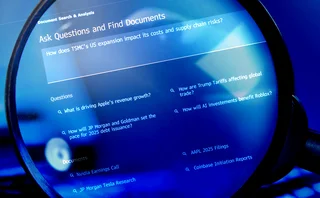Centralization Moves to the Foreground
Without collection and coordination of data, high quality is difficult to achieve

In April, data quality emerged as the prevailing theme of greatest concern in our coverage. This month, data centralization is in the spotlight. Coordination of data might be a better way to describe this. Certainly, centralizing and coordinating data ought to go hand in hand with raising the quality of data, if either effort is going to be meaningful or successful.
We start with news of the European Securities and Markets Authority's (ESMA) plans to centralize instrument and trading data to-of course-improve data quality, and the Depository Trust & Clearing Corporation's (DTCC) plans to align swaps data to better support analysis of the data. Then, in our interview with Fidelity ActionsXchange executive Will Dolan, he talks about how the corporate actions service brings together multiple data providers' inputs. Centralization is prevalent in these industry developments.
In Europe, ESMA's Trade Repositories Project, planned for the second half of 2016, promises a single access point to data in those repositories, and its Instrument Reference Data project, expected to be complete in 2017, ought to yield a central facility for both instrument and trading data. Such a central repository will also make regulatory compliance easier, observes Sapient's Cian O'Braonain. "Creating a centralized repository gives each of the different regulatory jurisdictions a similar toolset, a similar capability to be able to analyze and aggregate data," he says.
For both Europe and the US, DTCC's Marisol Collazo calls for a global standard for trade identification that will "resonate" for all jurisdictions. Such a standard has to include a definition of data quality across firms, repositories and regulators, and be supported by data aggregation efforts. DTCC's alignment of swaps data is meant to produce better analysis to feed into that data aggregation.
Centralization even turns up in parts of those data quality conversations, reported in "Steering the Drivers of Data Quality," in which Goldman Sachs' Gururaj Krishnan emphasizes that having "exactly one source" for data to be managed is an important point in the firm's data strategy. Alta Strategic consultant Dennis Gonzalez adds that coordinating sources of data and data operations units is important in efforts to deliver data quality.
Looking at another issue, the integration of Canadian trade reporting with its equivalent in all other global markets, a global, coordinated, centralized and aggregated data set would also be the foundation to accomplish that goal, as Collazo says in "Imperfect Harmony." To harmonize regulations for OTC derivatives worldwide, barriers in place precisely to keep data sets separate have to be removed. Two types of data sets-national or regional data sets for market surveillance, and smaller global data subsets for systemic risk oversight, are separated under data protection laws. So, harmonization of the data sets has become a factor in cross-border functions of the markets, as well.
With so many areas of data management touched by the need to centralize data, this effort ought to take on as much importance and urgency as the quest for higher data quality.
Only users who have a paid subscription or are part of a corporate subscription are able to print or copy content.
To access these options, along with all other subscription benefits, please contact info@waterstechnology.com or view our subscription options here: https://subscriptions.waterstechnology.com/subscribe
You are currently unable to print this content. Please contact info@waterstechnology.com to find out more.
You are currently unable to copy this content. Please contact info@waterstechnology.com to find out more.
Copyright Infopro Digital Limited. All rights reserved.
As outlined in our terms and conditions, https://www.infopro-digital.com/terms-and-conditions/subscriptions/ (point 2.4), printing is limited to a single copy.
If you would like to purchase additional rights please email info@waterstechnology.com
Copyright Infopro Digital Limited. All rights reserved.
You may share this content using our article tools. As outlined in our terms and conditions, https://www.infopro-digital.com/terms-and-conditions/subscriptions/ (clause 2.4), an Authorised User may only make one copy of the materials for their own personal use. You must also comply with the restrictions in clause 2.5.
If you would like to purchase additional rights please email info@waterstechnology.com
More on Data Management
EDM Council expands reach with Object Management Group merger
The rebranded EDM Council now includes members from industries outside financial services.
As datacenter cooling issues rise, FPGAs could help
IMD Wrap: As temperatures are spiking, so too is demand for capacity related to AI applications. Max says FPGAs could help to ease the burden being forced on datacenters.
Bloomberg introduces geopolitical country-of-risk scores to terminal
Through a new partnership with Seerist, terminal users can now access risk data on seven million companies and 245 countries.
A network of Cusip workarounds keeps the retirement industry humming
Restrictive data licenses—the subject of an ongoing antitrust case against Cusip Global Services—are felt keenly in the retirement space, where an amalgam of identifiers meant to ensure licensing compliance create headaches for investment advisers and investors.
LLMs are making alternative datasets ‘fuzzy’
Waters Wrap: While large language models and generative/agentic AI offer an endless amount of opportunity, they are also exposing unforeseen risks and challenges.
Cloud offers promise for execs struggling with legacy tech
Tech execs from the buy side and vendor world are still grappling with how to handle legacy technology and where the cloud should step in.
Bloomberg expands user access to new AI document search tool
An evolution of previous AI-enabled features, the new capability allows users to search terminal content as well as their firm’s proprietary content by asking natural language questions.
CDOs must deliver short-term wins ‘that people give a crap about’
The IMD Wrap: Why bother having a CDO when so many firms replace them so often? Some say CDOs should stop focusing on perfection, and focus instead on immediate deliverables that demonstrate value to the broader business.








